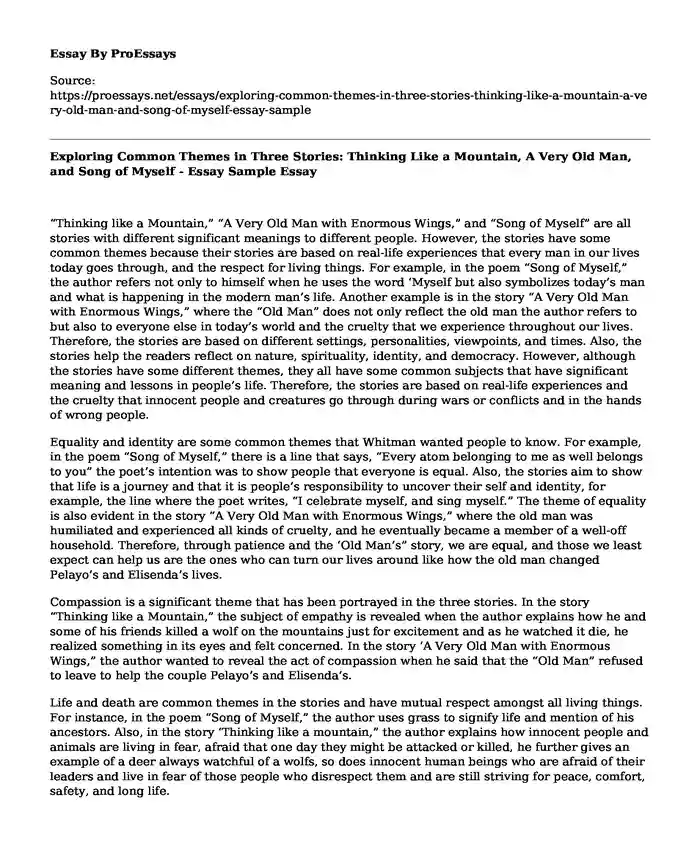“Thinking like a Mountain,” “A Very Old Man with Enormous Wings,” and “Song of Myself” are all stories with different significant meanings to different people. However, the stories have some common themes because their stories are based on real-life experiences that every man in our lives today goes through, and the respect for living things. For example, in the poem “Song of Myself,” the author refers not only to himself when he uses the word ‘Myself but also symbolizes today’s man and what is happening in the modern man’s life. Another example is in the story “A Very Old Man with Enormous Wings,” where the “Old Man” does not only reflect the old man the author refers to but also to everyone else in today’s world and the cruelty that we experience throughout our lives. Therefore, the stories are based on different settings, personalities, viewpoints, and times. Also, the stories help the readers reflect on nature, spirituality, identity, and democracy. However, although the stories have some different themes, they all have some common subjects that have significant meaning and lessons in people’s life. Therefore, the stories are based on real-life experiences and the cruelty that innocent people and creatures go through during wars or conflicts and in the hands of wrong people.
Equality and identity are some common themes that Whitman wanted people to know. For example, in the poem “Song of Myself,” there is a line that says, “Every atom belonging to me as well belongs to you” the poet’s intention was to show people that everyone is equal. Also, the stories aim to show that life is a journey and that it is people’s responsibility to uncover their self and identity, for example, the line where the poet writes, “I celebrate myself, and sing myself.” The theme of equality is also evident in the story “A Very Old Man with Enormous Wings,” where the old man was humiliated and experienced all kinds of cruelty, and he eventually became a member of a well-off household. Therefore, through patience and the ‘Old Man’s” story, we are equal, and those we least expect can help us are the ones who can turn our lives around like how the old man changed Pelayo’s and Elisenda’s lives.
Compassion is a significant theme that has been portrayed in the three stories. In the story “Thinking like a Mountain,” the subject of empathy is revealed when the author explains how he and some of his friends killed a wolf on the mountains just for excitement and as he watched it die, he realized something in its eyes and felt concerned. In the story ‘A Very Old Man with Enormous Wings,” the author wanted to reveal the act of compassion when he said that the “Old Man” refused to leave to help the couple Pelayo’s and Elisenda’s.
Life and death are common themes in the stories and have mutual respect amongst all living things. For instance, in the poem “Song of Myself,” the author uses grass to signify life and mention of his ancestors. Also, in the story ‘Thinking like a mountain,” the author explains how innocent people and animals are living in fear, afraid that one day they might be attacked or killed, he further gives an example of a deer always watchful of a wolfs, so does innocent human beings who are afraid of their leaders and live in fear of those people who disrespect them and are still striving for peace, comfort, safety, and long life.
Cite this page
Exploring Common Themes in Three Stories: Thinking Like a Mountain, A Very Old Man, and Song of Myself - Essay Sample. (2023, Oct 20). Retrieved from https://proessays.net/essays/exploring-common-themes-in-three-stories-thinking-like-a-mountain-a-very-old-man-and-song-of-myself-essay-sample
If you are the original author of this essay and no longer wish to have it published on the ProEssays website, please click below to request its removal:
- Literary Analysis Essay on The Bean Eaters by Gwendolyn Brooks
- Maus: A Survivor's Tale Summary by Art Spiegelman - The Graphic Narrative of the Holocaust
- Essay Sample on Role of Women in Greek Mythology
- Essay Example on The Wasteland: T.S. Eliot's Take on 20th Century Chaos
- Literary Analysis Essay on "The Pit and the Pendulum" by Edgar Allan Poe
- Essay on The Lottery: A Fateful Annual Tradition in a Small Town
- Harper Lee's To Kill a Mockingbird: Racism, Coming of Age & Judgment - Essay Sample







